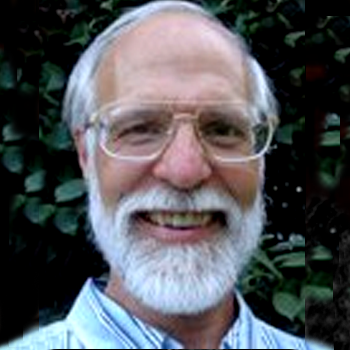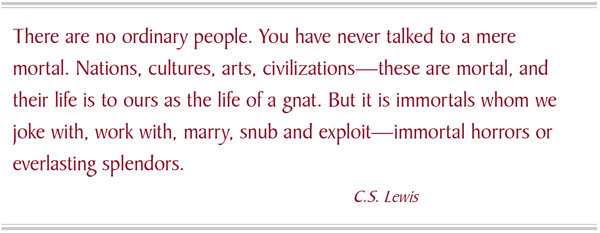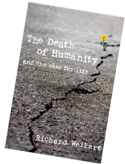Back to series


Recommended Reading:

Heeding C.S. Lewis’s Warnings against Dehumanizing Ideologies
Click here to open a Print - Friendly PDF
Many Christians recognize that we are living in a “culture of death,” where—especially in intellectual circles—there is easy acceptance of abortion and increasing support for physician-assisted suicide, infanticide, and euthanasia. While many Christians make cogent arguments against such practices—as they should—we seem to be losing ground. This is because our society is embracing secular philosophies and ideologies, many of which deny that the cosmos has any purpose, meaning, or significance. Once the cosmos is stripped of value, humanity is not far behind, especially since most secularists have also rejected any objective morality. Some intellectuals are complaining that humans are a “plague” whose population needs to be sharply reduced.1 The famous late-twentieth-century postmodernist philosopher Michel Foucault glorified sadomasochism, mob violence, suicide, and death. Despite this, or maybe because of it, the late Foucault was (and still is) a darling of many progressive intellectuals.
When C.S. Lewis cautioned about the dangers of dehumanizing secular ideologies in The Abolition of Man and his science fiction novel That Hideous Strength, many Christians took notice. But, on the whole, the intellectual world paid little heed, careening further down the fateful road against which Lewis warned. Lewis’s critique is still a powerful antidote to the degrading vision of humanity being foisted on us by intellectuals in many institutions of higher learning. I have tried to update Lewis’s critique in my new book, The Death of Humanity: And the Case for Life.
In The Abolition of Man, Lewis explained how dehumanizing ideas had insidiously crept inside of the British educational system in the mid-twentieth century. For example, textbook authors told impressionable students that when they call a waterfall sublime, they are not making a statement about the waterfall, but rather about their own feelings. Lewis pointed out that this exercise would lead students to two conclusions: that (1) all sentences about values are about the emotions of the speaker, and (2) these statements are ultimately unimportant.2 Many intellectuals make the same point about moral values, interpreting them as merely expressions of an individual’s preferences.
Lewis countered this denial of objective truth about morality or aesthetics with two objections. (1) In most cases, skepticism about values is selective. It is used to dismiss (often with contempt) the “traditional” values that one opposes, but it leaves untouched one’s own “progressive” values, which remain unstated but assumed. Lewis asserted, “A great many of those who ‘debunk’ traditional or (as they would say) ‘sentimental’ values have in the background values of their own which they believe to be immune from the debunking process.”3 Lewis understood the hypocrisy behind such debunking. (2) If we are not rational beings in a world with objective values, then we are “mere nature to be kneaded and cut into new shapes for the pleasures of masters who must, by hypothesis, have no motive but their own ‘natural’ impulses.”4 Thus Lewis recognized that controllers, who claim to be taking the destiny of humanity into their own hands, have no control over themselves.
 If everyone’s behavior is determined, ultimately no one can choose to control others. We are all controlled. The claims by the intelligentsia that they have superior knowledge or wisdom to manipulate the rest of humanity are then vacuous, because the intelligentsia’s statements are as much the product of random, material processes as the ideas and behavior of the masses.
If everyone’s behavior is determined, ultimately no one can choose to control others. We are all controlled. The claims by the intelligentsia that they have superior knowledge or wisdom to manipulate the rest of humanity are then vacuous, because the intelligentsia’s statements are as much the product of random, material processes as the ideas and behavior of the masses.
Their beliefs or plans have no special claim to be true or good or beautiful, since none of these categories exists. So why do they get so worked up when proclaiming the superiority of their policies and aspirations? Why do they become indignant at those who—through no fault of their own (since “fault” is nonexistent, according to their worldview)—continue to embrace values they oppose?
Perhaps they would respond—if they want to be consistent with their own deterministic philosophy—that they cannot help themselves. But I propose that at some level they view their beliefs as being superior to others’. Perhaps their indignation also indicates that they do think that others have some choice about their beliefs and values. The result of this impoverished view of humanity—that people are nothing more than clumps of chemicals thrown together by chance—is illustrated in Lewis’s novel That Hideous Strength. In this dystopia, scientists establish a National Institute of Coordinated Experiments (NICE), an agency that experiments on humans, to manage and transform the society.
These scientists see themselves as the new controllers of humanity, and they use every technique in their arsenal to manipulate their fellow humans—including torture and other not-so-NICE methods. They recruit the protagonist of the novel, Mark Studdock, to their program by telling him that since controlling humanity is inevitable, he might as well join them as a controller, rather than hesitating and becoming one of the controlled. In the view of the scientists at NICE, only physical reality matters, so “friendship is a chemical phenomenon; so is hatred.”5
Humans, being a conglomeration of chemicals subject to natural laws, have no special purpose or value. The NICE program involves extermination of those considered riffraff and human experimentation to move the species to a higher evolutionary stage. Nothing about humanity is sacred. As a sociologist, Studdock accepts most of these ideas at first—until he finds that he and other scientists at NICE are themselves the targets of manipulation and control. He rebels against the attempts to treat him as just another reagent in the elaborate experiment to reengineer society.
Lewis’s warnings against the “abolition of man” were certainly astute in the mid-twentieth century. Because so few people have heeded these warnings, they have not lost any of their poignancy. Indeed, the problems he exposed are more pronounced today than in his time; we need vigorous and compelling warnings to bring people to their senses.
Starting from a secular perspective, where human life is reduced to material processes, many intellectuals deny that human life has any intrinsic value or purpose or meaning. Many bioethicists are devaluing human life by arguing that some humans are “persons,” while others are not. These “nonpersons” generally include the unborn and those with cognitive disabilities. Some secular bioethicists, such as Peter Singer at Princeton, consign even newborn infants to the category of “nonpersons,” while others advocate “after-birth abortions.”

Because of these dehumanizing cultural tendencies, we need to embrace and even celebrate the value and significance of all humans, especially the weak and vulnerable, such as people with disabilities. Whatever their characteristics, all humans are made in the image of God and deserve our love. They are not merely some cosmic accident that emerged from random, impersonal processes. They are not merely a hunk of matter for us to manipulate or dominate.
This means we should once again take to heart Lewis’s admonitions to resist the rising tide of dehumanizing philosophies. With love and humility, but also with courage and boldness, we need to proclaim to our “culture of death” the sage words in the Declaration of Independence that “all men are created equal, that they are endowed by their Creator with certain unalienable Rights, that among these are Life, Liberty and the pursuit of Happiness.”
But words are not enough. We must show by our actions that we value the lives of those considered the least among us, whether they are unborn children, newborns with disabilities, adults with cognitive disabilities, or seniors with Alzheimer’s. By our loving words and deeds, we can build a culture of life. Otherwise, given the way our culture seems to be headed, we will witness the death of humanity.
|
Notes: |
|||

Richard Weikart
ProfessorRichard Weikart, is a professor of history at California State University, Stanislaus, and a senior fellow for the Center for Science and Culture of the Discovery Institute. He received a bachelor’s degree in 1980 from Texas Christian University and a master’s from Texas Christian University in 1989. With his Ph.D. in modern European history at the University of Iowa (1994), he received the biennial prize of the Forum for History of Human Sciences for the best dissertation in that field. He has published numerous articles, reviews and essays, and is the author of five books. His most recent book is The Death of Humility: And the Case for Life, exploring our culture’s declining respect for the sanctity of human life.

Recommended Reading:
Richard Weikart, The Death of Humanity: and the Case for Life (Regnery Faith, 2016)
The Death of Humanity explores our culture’s declining respect for the sanctity of human life, drawing on philosophy and history to reveal the dark road ahead for society if we lose our faith in human life.
 COPYRIGHT: This publication is published by C.S. Lewis Institute; 8001 Braddock Road, Suite 301; Springfield, VA 22151. Portions of the publication may be reproduced for noncommercial, local church or ministry use without prior permission. Electronic copies of the PDF files may be duplicated and transmitted via e-mail for personal and church use. Articles may not be modified without prior written permission of the Institute. For questions, contact the Institute: 703.914.5602 or email us.
COPYRIGHT: This publication is published by C.S. Lewis Institute; 8001 Braddock Road, Suite 301; Springfield, VA 22151. Portions of the publication may be reproduced for noncommercial, local church or ministry use without prior permission. Electronic copies of the PDF files may be duplicated and transmitted via e-mail for personal and church use. Articles may not be modified without prior written permission of the Institute. For questions, contact the Institute: 703.914.5602 or email us.
-
Recent Podcasts
Ralph Waldo Emerson’s Philosophy and Influence
by David George Moore on July 26, 2024Ralph Waldo Emerson was a gifted nineteenth century...Read More
-
The Side B Stories – Nate Sala’s Story
by Jana Harmon, Nate Sala on July 19, 2024
-
Terrorism Through the Eyes of Faith
by Dennis Hollinger on July 12, 2024
-
Recent Publications
Hasn’t Science Proven That Belief in God Is an Outdated Superstition?
by Sharon Dirckx on July 1, 2024Many assume that scientific practice and belief in...Read More
-
Has the Bible Been Corrupted as Some Muslims Claim?
by Andy Bannister on June 1, 2024
-
Seeing Jesus Through the Eyes of Women
by Rebecca McLaughlin on May 15, 2024
0
All Booked
0.00
All Booked
0.00
All Booked
22194
C.S. Lewis’s The Abolition of Man Live Online Small Group 8:00 PM ET
https://www.cslewisinstitute.org/?event=c-s-lewiss-the-abolition-of-man-study-course&event_date=2024-10-02®=1
https://www.paypal.com/cgi-bin/webscr
2024-10-02

Next coming event
Days
Hours
Minutes
Seconds
C.S. Lewis’s The Abolition of Man Live Online Small Group 8:00 PM ET
On October 2, 2024 at 8:00 pmSpeakers

Richard Weikart
Professor
Team Members

Richard Weikart
ProfessorRichard Weikart, is a professor of history at California State University, Stanislaus, and a senior fellow for the Center for Science and Culture of the Discovery Institute. He received a bachelor’s degree in 1980 from Texas Christian University and a master’s from Texas Christian University in 1989. With his Ph.D. in modern European history at the University of Iowa (1994), he received the biennial prize of the Forum for History of Human Sciences for the best dissertation in that field. He has published numerous articles, reviews and essays, and is the author of five books. His most recent book is The Death of Humility: And the Case for Life, exploring our culture’s declining respect for the sanctity of human life.






